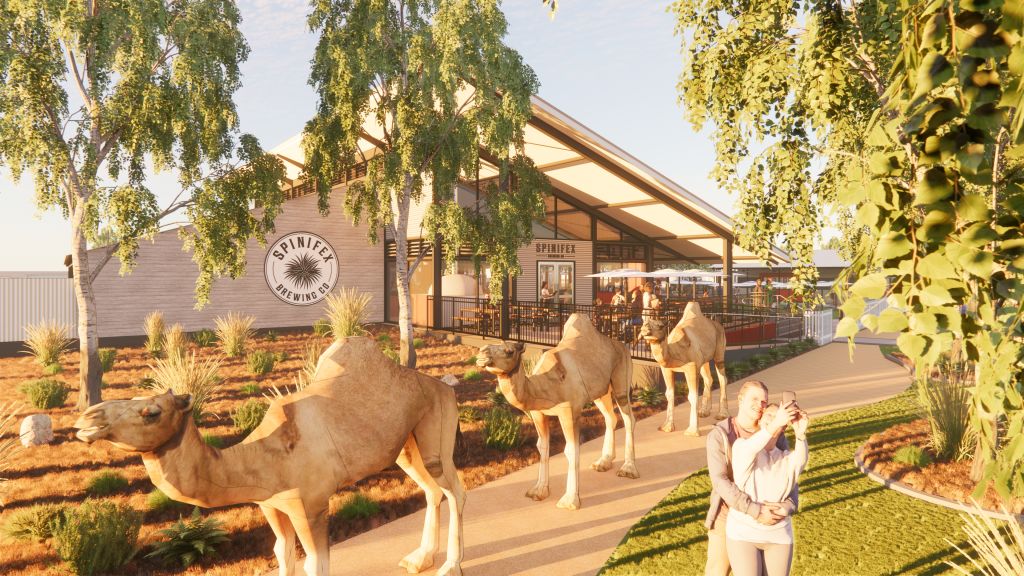The jury is in. We love craft beer with a conscience.
Look no further than the frothy tale of Spinifex Brewery, an Aboriginal and veteran-owned company in Western Australia that infuses beers with native botanicals.
The Indigenous-inspired flavours and unique backstory have proven a massive hit in the competitive and crowded craft brewing market.
And now the company from the Kimberley has got the green light to open an ale house in Broome. Partnering with FLBC Developments on the vacant site, the Cable Beach Spinifex Ale House will cater for 400-plus patrons.
“Broome is a tourism town, and rightly so,” says CEO and Broome local Adam Barnard. “Like most regional towns, we struggle to accommodate the number of visitors during the peak season.”
In addition to catering to tourists, the family-friendly venue hopes to win over the 15,000-strong population of the town. The development, costed at $5 million before the fit-out, is expected to open in late 2023.
Alongside a six hectolitre brewing facility, the venue will also be home to Bindam Mie’s Aboriginal bush foods packaging facility, specialising in gubinge and boab.
Plans have also been submitted for a similar venture in Perth, the North Beach Ale House; however, the approval process has been “challenging”.
“It’s a very big council to deal with,” Barnard says. “But that’s not saying we’re not making progress.”
From the outset, the team behind the botanical beers had always sought to move into bricks-and-mortar retailing. “We tested the market by not spending all this money on a brewery and putting it into sales and marketing, so we used other people’s equipment to brew our beer. It works because it reduces the risk, but your margins are greatly reduced.”
“Not only are we manufacturing our own beer [now], but we will be brewing in Broome.”
The past year’s success was preceded by a rocky start for the young brewing company, which attempted to launch into the eastern seaboard at the very beginning of the pandemic.
“I had a 100 per cent success rate in Queensland, NSW, Sydney, Melbourne…” recalls Barnard of his east coast tour in February of 2020. “From a universal yes everywhere to a country-wide shutdown four weeks later. It was a huge hit for me personally and the business.”
Barnard, an Army veteran, had invested the seed capital into Spinifex Brewery, the brainchild of three mates from Perth: Yamatji man Mick Little, Steve Jansen and John Gibbs.
“I could see how we were blending Aboriginal culture into tourism,” he says. “I thought, ‘this a really great concept’. The reality is it was a whole new genre of craft beer.”
With its growth plans stalled by the pandemic, the fledgling company temporarily pivoted to manufacture hand sanitiser, supplying major government departments in WA.
Returning to beer brewing, Spinifex focussed primarily on the Perth and broader West Australian market while the Delta and Omicron variants raged across the country. Staying local proved successful, with their products now stocked in major chains like BWS, Coles and Dan Murphy’s.
Supporting Aboriginal-owned native food producers, the brews rely on ingredients such as lemon myrtle, wax flower, wattleseed and gubinge, also known as Kakadu Plum.
“We produced our first batch of non-alcoholic ginger beer infused with gubinge. Over 400 Aboriginal people were involved in the wild harvest of gubinge,” Barnard says. “There were kids involved on country. It injected tens of thousands of dollars into remote Aboriginal communities.”
There are plans to double the harvest this coming season.
Spinifex also released the premium lager F88, named after an Australian defence force rifle. Half of all profits are donated to programs supporting veterans’ mental health in Perth.
It’s a personal topic for Barnard, who lost his sister’s partner – Afghanistan veteran Geoffrey Gregg – to suicide in 2006.
The company are building a reputation for “doing good things with great beer”, their aptly-worded slogan.
“Being a modern business, we are lucky that we have adopted a lot of the things that consumers want – Australian made, Australian-owned, environmentally friendly… so that’s helped us get a lot of attention.”
